Friday
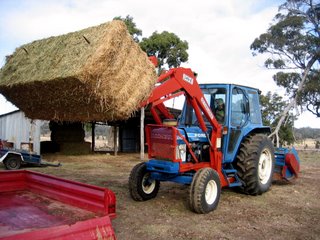
IT'S CHOW TIME DOWN ON THE FARM
Here we see Louisa loading the trailer and the truck with hay. This hay is so fresh and chock full of clover, you feel like taking a chomp yourself. We are lucky. When others say they can't find any hay, our supplier Ray Keith from Temora can always manage to find best quality feed for our sheep. The bales usually flake into 'biscuits' or 10cm slices which peel off easily. But this fresh fodder sticks together, making it a little difficult to keep up with the hungry hoards following the truck. (I'd have some shots of this but it is impossible to feed and photograph at the same time. Maybelater...)

THESE ARE SHEEP NUTS
They are a drought ration, a little like a breakfast cereal. They contain wheat, oats, barley, sorghum, bran, pollard, molasses, lucerne meal, maize meal, and other good things. They are very digestible. But we prefer the original grains, so while we wait for Mr Keith to deliver the oats and barley, we feed these nuts.
OUR 'PR' CAMPAIGN TO PROMOTE ADOPTASHEEP
This is the photograph we rushed into the living room and snapped after we received a call from The Daily Telegraph saying they were interested in doing a story but wanted some pictures. (We had sent them a press release.) Anyway, I drove to town today to pick up fuel and more sheep nuts and looked in the paper, but there was nothing there. Pushed off the front page by Kevin Rudd (who?). We are looking as sorrowful as we can because the person from the Daily Telegraph asked for it. We hate the steorytype of poor downtrodden famrers, but it sells newspapers, I suppose.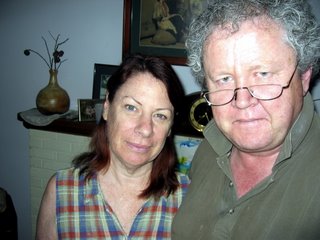 Here is some of the background material we included in the press release we sent to the world's leading newspapers (including the New York Times, The Times of London, and Der Speigel):
Here is some of the background material we included in the press release we sent to the world's leading newspapers (including the New York Times, The Times of London, and Der Speigel):
Michael and Louisa Kiely left the big city several years ago and ‘went bush’ to join the farming families fighting to make their dreams come true in the Australian outback. “We walked away from a marketing business that was very successful, but was tearing us apart as a couple,” says Michael Kiely. “It was always Louisa’s dream to go farming, and it was always my dream to stay married to her. So here we are.”
Australia is in the grip of the worst drought in living memory, with waterways drying up and dams at historic lows. The Kiely’s have battled drought for most of their farming career. They use special farming techniques to protect the environment from degradation and make the most of what rain falls. They were recognised in 2005 by being selected as among the 10 most innovative farm families in the Central West. They use greenhouse-friendly no-till farming and humane stock-handling techniques.
The Kiely’s were able to graze their flock on green pastures long after many neighbouring farms had started hand feeding, thanks to a system called time controlled grazing which allows the grasses time to recover and encourages ‘biological diversity’. They also keep a mob of kangaroos and wallabies on their farm.
“The ‘roos deserve a place to live, too. Unfortunately they get to the best grasses before the sheep do, but we’ve learned to live with that.”
The Kiely family has also made their own private reconciliation with the original Indigenous inhabitants of the land. Wiradjuri elders conducted a ‘welcome to country’ smoking ceremony during which the Kiely’s read a declaration of commitment to protect the land. (See http://envirofarming.blogspot.com)
This is the photograph we rushed into the living room and snapped after we received a call from The Daily Telegraph saying they were interested in doing a story but wanted some pictures. (We had sent them a press release.) Anyway, I drove to town today to pick up fuel and more sheep nuts and looked in the paper, but there was nothing there. Pushed off the front page by Kevin Rudd (who?). We are looking as sorrowful as we can because the person from the Daily Telegraph asked for it. We hate the steorytype of poor downtrodden famrers, but it sells newspapers, I suppose.
 Here is some of the background material we included in the press release we sent to the world's leading newspapers (including the New York Times, The Times of London, and Der Speigel):
Here is some of the background material we included in the press release we sent to the world's leading newspapers (including the New York Times, The Times of London, and Der Speigel):Michael and Louisa Kiely left the big city several years ago and ‘went bush’ to join the farming families fighting to make their dreams come true in the Australian outback. “We walked away from a marketing business that was very successful, but was tearing us apart as a couple,” says Michael Kiely. “It was always Louisa’s dream to go farming, and it was always my dream to stay married to her. So here we are.”
Australia is in the grip of the worst drought in living memory, with waterways drying up and dams at historic lows. The Kiely’s have battled drought for most of their farming career. They use special farming techniques to protect the environment from degradation and make the most of what rain falls. They were recognised in 2005 by being selected as among the 10 most innovative farm families in the Central West. They use greenhouse-friendly no-till farming and humane stock-handling techniques.
The Kiely’s were able to graze their flock on green pastures long after many neighbouring farms had started hand feeding, thanks to a system called time controlled grazing which allows the grasses time to recover and encourages ‘biological diversity’. They also keep a mob of kangaroos and wallabies on their farm.
“The ‘roos deserve a place to live, too. Unfortunately they get to the best grasses before the sheep do, but we’ve learned to live with that.”
The Kiely family has also made their own private reconciliation with the original Indigenous inhabitants of the land. Wiradjuri elders conducted a ‘welcome to country’ smoking ceremony during which the Kiely’s read a declaration of commitment to protect the land. (See http://envirofarming.blogspot.com)
WE WANT TO SHARE OUR IDEA WITH OTHER FARMERS
We know there are many farmers who need help more than we do. But what we did to launch a campaign like Adopt A Sheep can be done by anyone with a computer, an email account, access to the Internet and a willingness to try something new.
We used BLOGGER to build the site for FREE (3 easy steps).
We used PayPal to accept payments, NO UPFRONT COST, ie. FREE (six easy steps).
We did our own PR. (This isn't free. It took me several years to learn how to write a press release. But I'll write any genuine farmer's publicity material who does the first two steps). Going to a newspaper's website and finding out who to email is FREE and two easy steps.
We will send a simple step-by-step guide to any farmer who emails for it on michael@newhorizon.au.com
In fact, if it works (and it appears to) I will tour the country teaching farmers how to do it. I've promised Dan that we will push to have it made a national program, to teach farm families how to connect with city people. Bridging the City/Country Gap has always one of our dreams.
HOW TO GET STARTED
The whole thing starts with an idea. That's the hardest part. Having ideas is a proud Australian farming tradition. I haven't met a farmer yet who wasn't an inventor.
Most marketing ideas are stolen. I stole the idea for Adopt A Sheep from World Vision which is running an "Adopt a Child for Christmas". Louisa and I were sitting at the kitchen table trying to decide whether to sell our breeding flock into a depressed market for a low price, and face buying a new flock after the drought at a high price. (DIsaster.) Or whether we can hope against hope that, if we hold out for 3 months, the rains will come... Then on comes this World Vision commercial, and I said 'adopt a chicken' as a joke, then out popped: "Adopt a sheep"... I got all excited about it, but Louisa thought it was too stupid for words and wouldn't cheer up. She was depressed and went to bed. I followed after clearing my email, but she was asleep. I tossed and turned and fell asleep, but got up around 3am and went to the computer and started work. By 7am I had finished the basics.
I had already taught myself how to create a blogsite. (3 steps) I had already taught myself how to download photos from the digital camera and upload them to the blog site. (5 steps) What I didn't know was about PayPal. Like anything else connected with technology, I was taught how to learn it from my grandson - push all the buttons and see what happens. A half-hour later I had installed PayPal as a "Make a donation" button on the blogsite.
It's that easy. It's that hard.
We know there are many farmers who need help more than we do. But what we did to launch a campaign like Adopt A Sheep can be done by anyone with a computer, an email account, access to the Internet and a willingness to try something new.
We used BLOGGER to build the site for FREE (3 easy steps).
We used PayPal to accept payments, NO UPFRONT COST, ie. FREE (six easy steps).
We did our own PR. (This isn't free. It took me several years to learn how to write a press release. But I'll write any genuine farmer's publicity material who does the first two steps). Going to a newspaper's website and finding out who to email is FREE and two easy steps.
We will send a simple step-by-step guide to any farmer who emails for it on michael@newhorizon.au.com
In fact, if it works (and it appears to) I will tour the country teaching farmers how to do it. I've promised Dan that we will push to have it made a national program, to teach farm families how to connect with city people. Bridging the City/Country Gap has always one of our dreams.
HOW TO GET STARTED
The whole thing starts with an idea. That's the hardest part. Having ideas is a proud Australian farming tradition. I haven't met a farmer yet who wasn't an inventor.
Most marketing ideas are stolen. I stole the idea for Adopt A Sheep from World Vision which is running an "Adopt a Child for Christmas". Louisa and I were sitting at the kitchen table trying to decide whether to sell our breeding flock into a depressed market for a low price, and face buying a new flock after the drought at a high price. (DIsaster.) Or whether we can hope against hope that, if we hold out for 3 months, the rains will come... Then on comes this World Vision commercial, and I said 'adopt a chicken' as a joke, then out popped: "Adopt a sheep"... I got all excited about it, but Louisa thought it was too stupid for words and wouldn't cheer up. She was depressed and went to bed. I followed after clearing my email, but she was asleep. I tossed and turned and fell asleep, but got up around 3am and went to the computer and started work. By 7am I had finished the basics.
I had already taught myself how to create a blogsite. (3 steps) I had already taught myself how to download photos from the digital camera and upload them to the blog site. (5 steps) What I didn't know was about PayPal. Like anything else connected with technology, I was taught how to learn it from my grandson - push all the buttons and see what happens. A half-hour later I had installed PayPal as a "Make a donation" button on the blogsite.
It's that easy. It's that hard.
THESE PEOPLE ARE MY HEROES
 Goph on the right. The driver who came 12 hours too early on the left.
Goph on the right. The driver who came 12 hours too early on the left.
We had a brilliant example of the type of community spirit and genuine support that you find in the country the other night. We were out late feeding (too late because the sheep need to find their camp for the night, not run around eating). Daniel and I were trying to lure half the flock out of one paddock into another, there was a breakout and they ran as a mob all the way to the hay shed for a feed (ignoring the fact we were about the feed out anyway). Whatever, we were feeding late when Louisa came up on a quad bike saying the semitrailer had arrived carrying the load of oats that we ordered when we decided to feed for 100 days and punt on Adopt A Sheep to pay for it.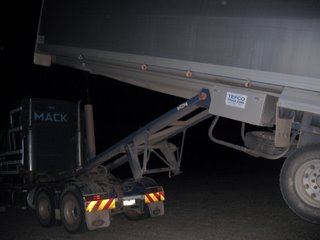 It was 7.30pm and the truck was exactly 12 hours early. (Not unusual.) It turns out the semi pulled up at the Goolma pub to ask the way to our place.
It was 7.30pm and the truck was exactly 12 hours early. (Not unusual.) It turns out the semi pulled up at the Goolma pub to ask the way to our place.
 Two of the locals filled their esky and led the driver out to "Uamby". Not only that, Goph (Col Doherty, one of our shearers and our guardian angel) connected up the auger we had borrowed from Carol Burns, a local farmer.
Two of the locals filled their esky and led the driver out to "Uamby". Not only that, Goph (Col Doherty, one of our shearers and our guardian angel) connected up the auger we had borrowed from Carol Burns, a local farmer. 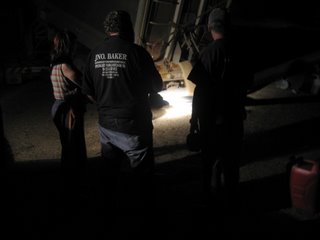 He rigged up spotlights so the driver could unload. And he even switched the auger on without the key so the loading could start. (Dan had the key on him.)
He rigged up spotlights so the driver could unload. And he even switched the auger on without the key so the loading could start. (Dan had the key on him.) 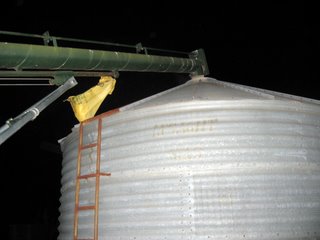 Then we stood around having a beer and watching the precious grain pouring into the tray of the auger and yelling a conversation above the din of the auger engine and the spiralling carrying mechanism within the huge pipe carting the grain to the top of the silo. At the outlet chute was a pile of old weavilly corn left over from the last time we hand fed grain.
Then we stood around having a beer and watching the precious grain pouring into the tray of the auger and yelling a conversation above the din of the auger engine and the spiralling carrying mechanism within the huge pipe carting the grain to the top of the silo. At the outlet chute was a pile of old weavilly corn left over from the last time we hand fed grain. 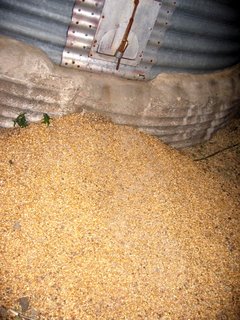 Afterwards it was back to the homestead and beers on the front verandah with the light off and just the stars above. Dan and Goph sat yarning til the wee hours... This voluntary helping out is like an old fashioned American barn raising. People do it because they like being together, doing something useful.
Afterwards it was back to the homestead and beers on the front verandah with the light off and just the stars above. Dan and Goph sat yarning til the wee hours... This voluntary helping out is like an old fashioned American barn raising. People do it because they like being together, doing something useful.
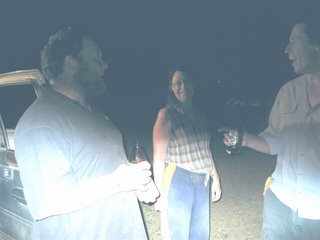
These people will drop everything and come to your assistance. For instance, on day we had a ram with very extended horns was delivered and we put him on his own in a yard near the other rams so he could settle down and we could ease him into the mob. But he jumped out and ran amok, finally getting his horns trapped in a grill and threatening to break his neck. (He cost $1500). Daniel was away. Louisa and I didn't feel competent to wrestle a fairly irate ram. So I called around and found Dan Gorrie in the pub, talking to a guy about a fencing job. Dan Gorrie is a neighbour. Within 10 minutes he was out at "Uamby", plucked the grill off the ram's horns, returned it to the yard, and stayed for a drink and a long chat. Country people can't see someone needing help without doing something about it. Wonderful. (I think they feel we city slickers need to be watched over in case we get into some real trouble.)
Between you and me, something I've noticed... People out here resent it when they hear reports about how buggered we are, ie. depressed, weary, desolate, etc. It's strange because we are all of those things. But maybe they're too proud to be comfortable being thought of as defeated. It's the same reason Centrelink has to beg farmers to apply for relief funding. They are fiercely independent and proud to be so. They are always making jokes. Laughing in the face of disaster. Like that Stan Cross cartoon: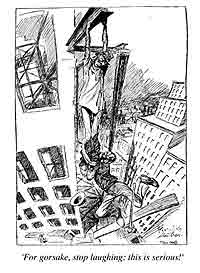
 Goph on the right. The driver who came 12 hours too early on the left.
Goph on the right. The driver who came 12 hours too early on the left.We had a brilliant example of the type of community spirit and genuine support that you find in the country the other night. We were out late feeding (too late because the sheep need to find their camp for the night, not run around eating). Daniel and I were trying to lure half the flock out of one paddock into another, there was a breakout and they ran as a mob all the way to the hay shed for a feed (ignoring the fact we were about the feed out anyway). Whatever, we were feeding late when Louisa came up on a quad bike saying the semitrailer had arrived carrying the load of oats that we ordered when we decided to feed for 100 days and punt on Adopt A Sheep to pay for it.
 It was 7.30pm and the truck was exactly 12 hours early. (Not unusual.) It turns out the semi pulled up at the Goolma pub to ask the way to our place.
It was 7.30pm and the truck was exactly 12 hours early. (Not unusual.) It turns out the semi pulled up at the Goolma pub to ask the way to our place. Two of the locals filled their esky and led the driver out to "Uamby". Not only that, Goph (Col Doherty, one of our shearers and our guardian angel) connected up the auger we had borrowed from Carol Burns, a local farmer.
Two of the locals filled their esky and led the driver out to "Uamby". Not only that, Goph (Col Doherty, one of our shearers and our guardian angel) connected up the auger we had borrowed from Carol Burns, a local farmer.  He rigged up spotlights so the driver could unload. And he even switched the auger on without the key so the loading could start. (Dan had the key on him.)
He rigged up spotlights so the driver could unload. And he even switched the auger on without the key so the loading could start. (Dan had the key on him.)  Then we stood around having a beer and watching the precious grain pouring into the tray of the auger and yelling a conversation above the din of the auger engine and the spiralling carrying mechanism within the huge pipe carting the grain to the top of the silo. At the outlet chute was a pile of old weavilly corn left over from the last time we hand fed grain.
Then we stood around having a beer and watching the precious grain pouring into the tray of the auger and yelling a conversation above the din of the auger engine and the spiralling carrying mechanism within the huge pipe carting the grain to the top of the silo. At the outlet chute was a pile of old weavilly corn left over from the last time we hand fed grain.  Afterwards it was back to the homestead and beers on the front verandah with the light off and just the stars above. Dan and Goph sat yarning til the wee hours... This voluntary helping out is like an old fashioned American barn raising. People do it because they like being together, doing something useful.
Afterwards it was back to the homestead and beers on the front verandah with the light off and just the stars above. Dan and Goph sat yarning til the wee hours... This voluntary helping out is like an old fashioned American barn raising. People do it because they like being together, doing something useful.
These people will drop everything and come to your assistance. For instance, on day we had a ram with very extended horns was delivered and we put him on his own in a yard near the other rams so he could settle down and we could ease him into the mob. But he jumped out and ran amok, finally getting his horns trapped in a grill and threatening to break his neck. (He cost $1500). Daniel was away. Louisa and I didn't feel competent to wrestle a fairly irate ram. So I called around and found Dan Gorrie in the pub, talking to a guy about a fencing job. Dan Gorrie is a neighbour. Within 10 minutes he was out at "Uamby", plucked the grill off the ram's horns, returned it to the yard, and stayed for a drink and a long chat. Country people can't see someone needing help without doing something about it. Wonderful. (I think they feel we city slickers need to be watched over in case we get into some real trouble.)
Between you and me, something I've noticed... People out here resent it when they hear reports about how buggered we are, ie. depressed, weary, desolate, etc. It's strange because we are all of those things. But maybe they're too proud to be comfortable being thought of as defeated. It's the same reason Centrelink has to beg farmers to apply for relief funding. They are fiercely independent and proud to be so. They are always making jokes. Laughing in the face of disaster. Like that Stan Cross cartoon:


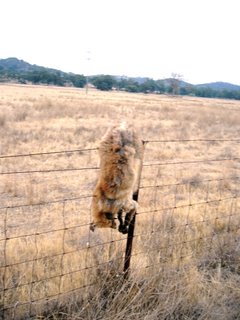
DAN's story
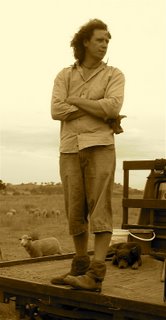
Wiping the sleep from my eyes feeling drugged and limp I drag myself from my cot and notice the time is before the magic hour of 5 and realise that this actually makes me feel happy. You see if it gets too far past the happy hour then the sun starts to show itself and well there goes the nice cool breeze that most mornings have. This morning however is accompanied by a stifling smell of bushfire and a breeze that carries the heat and gives me exactly no relief on the fifty-meter walk from my cottage to the homestead.
My life before farming was spent much of the time with my feet off the ground or at least on ground that was having trouble fighting gravity. Industrial Rope Access, Climbing Guide, mountaineer. So the change from extreme sports to extreme farming has been eye opening, comical at times and wholly satisfying. The comical times were often when in search of some help with things many considered ‘general knowledge’, the looks and reactions I got from some of the locals were priceless. This happened until I was taken under the wing of an elderly gent who found my lack of knowledge as funny as I did.
Now in the fourth year of my rural adventure and the third year of drought I find myself in a dry spell that has wiped the monopoly board clean, levelling many of the weathered and tested members of the local area with them never experiencing this situation before themselves.
Coming into farming after being a city fella I can totally empathise with the urban public in relation to not knowing what is going on out in the paddocks these days with the media dictating much of what is seen. City folk seem to have the same feeling talking to me as they may when talking to a person in a wheel chair. People have trouble looking at you and speak with a very uncomfortable edge.
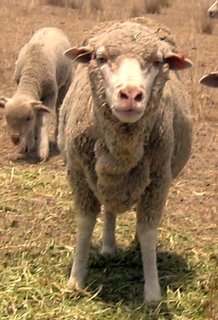
Finally making it across to the homestead the lack of air conditioning and the poor circulation that this house made in the 50s has makes it easy to get some tea and head on out to feed. With the size of today’s grain ration swirling around my head I realise that it is in fact a day for hay and that the remnants of yesterdays grain feed will make it to some lucky ewes mouth this morning, although probably one of the already fat stronger feeders. See within a mob there are leaders and followers, shy and strong feeders and old and wise and young and not-as-wise-yet sheep. This makes the pattern that you make while feeding all important. It needs to be as much zig as zag and it also helps if you come back to where you started as this is generally where the shy will be looking on longingly at the stronger feeding.
Feeding out by oneself is an event in itself. Low range, first gear and a prayer. You pray to be guided smooth and true and to avoid rocks, ditches and trees. With the occasional 180 degree turn to avoid the fence line.
So you feed out with the symphony of sheep drowning out the idol of the engine and the radio and generally anything else that could possibly be making noise, dog yelping from being run over by the sheep perhaps. They follow as you walk behind the trailer some diving in for a mouthful of hay before the biscuit has been detached from the bale, stalling the process for seconds and receiving a quick boot to the shoulder if they are not fast enough away. If a large section of hay does happen to fall without being broken into biscuits then I have to run to stop the ute from travelling and whistle the dogs. They enjoy a game of keep away, they have even gotten to the point where I am sure they leave enough room for the sheep to get a little to close so they can lunge at them, never making contact of course as they are very good work dogs and know the protocol.
Back at the ute I get the dogs to clear a path so I can get moving again, always very tempted to sheep surf at this point as they are so very tightly packed in around me. Moving again we continue the feeding, past the most recently dead. Crows having needed the protein of their eyes more than the sheep needed to see obviously, leaving them to foxs of the night. Guard alpacas do well for foxes, not for crows.
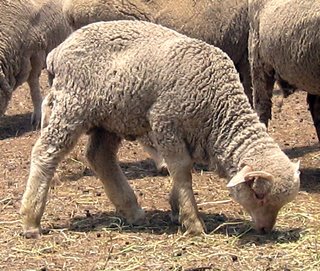 Sometimes a sheep lays down and is not able to get up again. This is because its internal organs have shifted to one side and it doesn’t have the strength to counteract this uneven weight distribution. I re-read an email that I sent a girlfriend that I had when I started farming and it said “I have bought a whole lot of pads and pencils and have distributed them to the sheep in hope that I will find a note on the next one I find dead with an explanation as to why they have died.” This is obviously a vain hope as I could never understand their writing although it does illustrate the difficulty in finding a seemingly healthy creature dead.
Sometimes a sheep lays down and is not able to get up again. This is because its internal organs have shifted to one side and it doesn’t have the strength to counteract this uneven weight distribution. I re-read an email that I sent a girlfriend that I had when I started farming and it said “I have bought a whole lot of pads and pencils and have distributed them to the sheep in hope that I will find a note on the next one I find dead with an explanation as to why they have died.” This is obviously a vain hope as I could never understand their writing although it does illustrate the difficulty in finding a seemingly healthy creature dead. With the drought in full swing death is becoming more apparent. Sheep that were getting a full feed ration just laying there almost mockingly saying ‘you tried and failed the lesson is never try!’ Yet I know that it isn’t personal and not just my sheep. On other properties a cow having had trouble during birth the night before, a stud horse lays oddly still in a paddock with none of the other horses coming near it and no notes left behind.

The horse was properly fed and the cow may have had trouble even in a good season but the dry amplifies the event, puts it under a spot light.
I spend a lot of my time walking around on my farm checking stock, water, feed anything else that needs looking at. I walk as it gets me closer to my ground zero. The action is happening under my feet and I can see how the earth is reacting to how I am treating it with my stock. I walk among the sheep, watching their reaction to me and their general habits, it is very mediative and useful to see the health of your stock. I can’t do this anymore. If the sheep see me enter the paddock they will mob me. Coming right up to me and smelling my hands with hungry eyes, wasting valuable energy running to see me. When I leave a paddock after feeding I look up at the happy heads all down consuming their fill before their neighbour does, I look up and wish that I had more to give as I know that what is on the ground will be gone in half an hour. But I can’t give more, what I am giving is a measured ration both economically and weight. They say that a sheep only takes in 2% more water if it doesn’t have shade in its paddock, but I have seen sheep search out the shade of its neighbours shadow, now tell me that he wouldn’t rather a tree. So who do I listen to the hungry sheep or the measurement book. Do I go broke trying to keep everyone alive or do I make the call of acceptable losses?
When I arrived on the farm from the city I was very much of the ideal that farmers complain a lot and that if the system is so inherently flawed then it isn’t sustainable and that it needs to be changed. More and more farmers are now coming to this very conclusion but are stuck with the question of How then? How do we do it sustainably as even the current sustainability books are being rewritten. In Sydney I had the pleasure of being the shoulder for a confused friend who was looking to end what to them was seemingly a horrible existence. Out here I have had the pleasure of removing a shotgun from the mouth of a farming friend with the same loss of hope. With only one of them have I felt I could understand the difficulty in struggling on.
I have realised that farming isn’t hard or horrible but constant. Like chinese water torture drip, drip, drip, drip. Even as I sit here writing farming is going on out in my paddocks. I spent my first year of lambing driving to different spots near the paddocks the sheep were giving birth in, climbing on the roof racks of my 4wd and watching the sheep through binoculars for hours at a time. A lump on the ground was watched with interest until it would stand and walk off. I saw a lot, helped a few then one night a particularly violent rain and wind storm came through. 96 little bodies were what I found the next morning. I can tell you I didn’t need a note for those ones.

